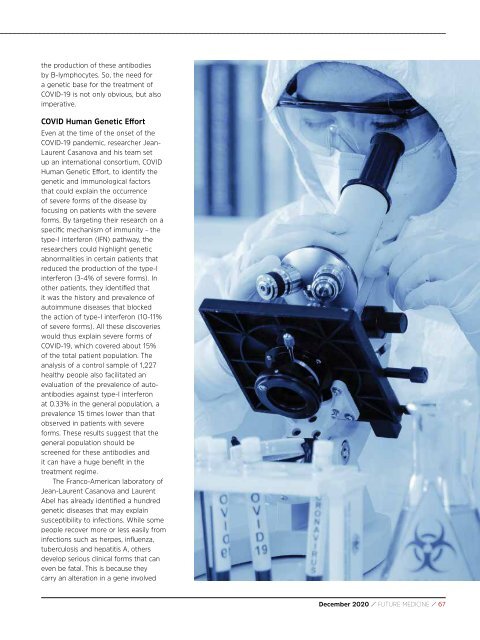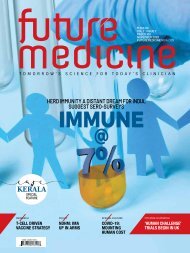You also want an ePaper? Increase the reach of your titles
YUMPU automatically turns print PDFs into web optimized ePapers that Google loves.
the production of these antibodies<br />
by B-lymphocytes. So, the need for<br />
a genetic base for the treatment of<br />
COVID-19 is not only obvious, but also<br />
imperative.<br />
COVID Human Genetic Effort<br />
Even at the time of the onset of the<br />
COVID-19 pandemic, researcher Jean-<br />
Laurent Casanova and his team set<br />
up an international consortium, COVID<br />
Human Genetic Effort, to identify the<br />
genetic and immunological factors<br />
that could explain the occurrence<br />
of severe forms of the disease by<br />
focusing on patients with the severe<br />
forms. By targeting their research on a<br />
specific mechanism of immunity - the<br />
type-I interferon (IFN) pathway, the<br />
researchers could highlight genetic<br />
abnormalities in certain patients that<br />
reduced the production of the type-I<br />
interferon (3-4% of severe forms). In<br />
other patients, they identified that<br />
it was the history and prevalence of<br />
autoimmune diseases that blocked<br />
the action of type-I interferon (10-11%<br />
of severe forms). All these discoveries<br />
would thus explain severe forms of<br />
COVID-19, which covered about 15%<br />
of the total patient population. The<br />
analysis of a control sample of 1,227<br />
healthy people also facilitated an<br />
evaluation of the prevalence of autoantibodies<br />
against type-I interferon<br />
at 0.33% in the general population, a<br />
prevalence 15 times lower than that<br />
observed in patients with severe<br />
forms. These results suggest that the<br />
general population should be<br />
screened for these antibodies and<br />
it can have a huge benefit in the<br />
treatment regime.<br />
The Franco-American laboratory of<br />
Jean-Laurent Casanova and Laurent<br />
Abel has already identified a hundred<br />
genetic diseases that may explain<br />
susceptibility to infections. While some<br />
people recover more or less easily from<br />
infections such as herpes, influenza,<br />
tuberculosis and hepatitis A, others<br />
develop serious clinical forms that can<br />
even be fatal. This is because they<br />
carry an alteration in a gene involved<br />
<strong>December</strong> <strong>2020</strong> / FUTURE MEDICINE / 67

















